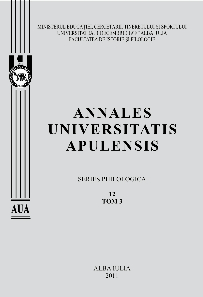Feminist Theories in the 20th Century
Feminist Theories in the 20th Century
Author(s): Marinela LupsaSubject(s): Literary Texts
Published by: Universitatea »1 Decembrie 1918« Alba Iulia
Keywords: Feminism; Feminist theories; Criticism.
Summary/Abstract: The feminist movement has become an established area of literary criticism. The main focus of feminism has been the definition of women’s identity within a society mainly regarded as ‘patriarchal’. Constructed as a concern with women, with reshaping previous ways in which they were valued, feminism also entails the rejection of certain cultural stereotypes, distinctions pertaining to human qualities, according to which women were considered the weak sex, less able to shape and take control of their destinies, both in personal, and in social, economic and political terms. Women have either been regarded as oppressed nature, or as universal victims, whose access to public discourse has been denied. In this respect, the concern of the feminist movement is to transform the generalized perception of women, by demonstrating that the dominant beliefs regarding them are the consequence of a process of permanent mythologizing. Generally, feminism refers to a belief that informed the theoretical basis of the movement until recently, when concepts such as ‘sexuality’ and ‘sexual difference’ became real fields of redefinition. Being a protest movement, feminism has accomplished its basic objectives in terms of achieving for women equal status with men: women have earned the right to vote, the right to participate and to take decisions in the political field. Feminism has been revived in its second phase, the ‘Second Wave’. The liberation movement of the 1960s and early 1970s originated in the experience of women in a society that was largely conceived as oppressive, a society the characteristic of which was epitomized by the term ‘patriarchy’. Despite the fact that the term has a lot of implications, its common denominator has been the process whereby women defined themselves and their place in a society that had regarded the complexity of their lives and experience as marginal and insignificant other than in relation to male ‘rule’, which meant control.
Journal: Annales Universitatis Apulensis. Series Philologica
- Issue Year: 12/2011
- Issue No: 2
- Page Range: 17-31
- Page Count: 13
- Language: English

